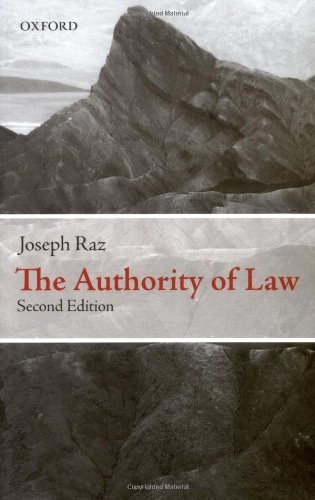
《The Authority of Law》理约瑟夫·拉茲法律的权威的笔记
1
0

热情小柚子 2023-10-13 23:52:12
1 Legitimate Authority
In this section, Raz discusses the concept of legitimate authority and its paradoxical nature. He raises several questions to gain a deeper understanding of the concept.
1. Raz introduces four types of confusion related to the nature of authority and aims to explain how these confusions lead to his explication of authority as a source of justification. He further explores the third and fourth types of confusion to develop his argument on the nature of authority.
2. Raz examines whether order and authority are interchangeable in specific contexts, particularly on page 23.
3. The meaning of "legitimate authority" and whether "legitimate" refers solely to the source or the scope of authority is analyzed.
4. The argument on page 6 is not clear for the reader, despite Razs conclusion being apparent. The reader struggles to comprehend the content of the argument.
Next, Raz summarizes the two main challenges he identifies in the study of "authority": methodological challenges arising from different conceptions of authority and inherent paradoxes within authority itself.
The paradoxical challenges in authority, according to Raz, can be categorized into conflicts between "authority" and "reason" or "autonomy." The former represents the conflict between obedience to authority and the reasons of the obedient, leading to authority being considered irrational. The latter presents a conflict between autonomy, where individuals form their own judgments on all moral questions and may conflict with authority.
In terms of the relationship between authority and reason, autonomy, Raz argues that in practical terms, authority rejects moral autonomy, and thus, it is perceived as immoral. However, in theoretical terms (to theoretical authority), moral considerations may not be relevant, and authority could still be irrational.
Raz claims that these tensions between authority and reason, autonomy challenge the believability of rightful authority. The skepticism towards legitimate authority arises from the fundamental principles of reason, expanding beyond political authority to any type of authority among rational individuals. Supporters of legitimate authority are burdened with significant rational and moral responsibilities, and some may choose to accept that authority cannot possess legitimacy rather than confront the true challenges posed by reasons, rationality, autonomy, and morality.
Raz aims to explain why these paradoxical challenges are superficial by examining the nature of authority. He states that previous studies on authority focused on how people accept authority, leading to confusion. Raz then provides examples of four types of confusion that exist in modern studies on the nature of authority in order to explain the essence of authority.
The first confusion investigates the conditions for effective or de facto authority without delving into the nature of authority itself.
The second confusion focuses on the justification of legitimate or de jure authority, aiming to explain the essence of authority by examining how claims to authority justify action. This line of study assumes that claims to authority are a distinct way of justifying action and are not synonymous with other ways of justifying action. However, Raz argues that this conclusion is not definitive, as the justification of claims to authority might not be distinct from the justification of other actions, and the nature of action might differ between authority-action and authority-justifying-action.
Raz expresses doubt regarding claims that some individuals are born with authority over others, as this may be a substantive error in moral or political theory rather than an accurate application of the concept of authority.
The third confusion equates the ability to perform specific actions with factual authority, implying power over others actions and destinies. Raz argues that factual authority does not necessarily imply legitimacy and that justifying factual authority relies on the concept of legitimate authority.
The fourth confusion assumes that authority can be understood through the concept of rules. Raz argues that this confusion is a variation of the first and second confusions, which explain authority as a result of attaining the authority by following rules. Raz believes that this position fails to prove what having authority means, why it is possible, and which authorities make us authoritative. Additionally, the assumption that all authority stems from a system of rules is questionable, and conflicts within the rule system might challenge the granting of authoritative power.
Raz concludes that attempts to understand the essence of authority based on legitimate or effective authority fail to address the study of authority itself. However, these attempts do reveal that authority is "the ability to perform specific types of actions that are justified by a particular type of reasoning." They do not directly explain authority but shed light on how it functions as a capacity to perform actions.
Raz takes a methodological detour to explore past and modern research on the essence of authority. Previous studies focused on how people accept authority, including social contracts and conquests, leading to confusion. Modern studies on the essence of authority still encounter methodological confusion, as Raz illustrates with four examples that aim to explain the nature of authority:
The first confusion centers on the necessary and sufficient conditions for effective authority, but these studies do not address the nature of authority itself.
The second confusion revolves around the necessary and sufficient conditions for legitimate authority. These studies focus on justifying claims to authority as a way of explaining the essence of authority, assuming that claims to authority are distinct from other ways of justifying action. This line of inquiry suggests that authority must be different from other justifying actions. However, Raz argues that this conclusion is not necessarily true, as different justifications of authority might not imply the same nature of action in authority-action and authority-justifying-action.
Raz finds the relationship between authority and action persuasive: authority demands specific actions and initially confers justification to those actions. Consequently, one can say that the actor is authorized to perform the respective action without further justification.
However, it is difficult to assert that authority being one way of justifying action can prove that authority can be justified because multiple types of authorities exist across different areas, making it challenging to claim that authority is merely one way of justifying action (claims to authority-justifying-action-authority can be justified). Moreover, the reference to types of arguments (in the third paragraph of page six) and Razs overall argument about the fallacy in this method is unclear.
Aside from Richard Tucks argument, some may hold beliefs such as "some people are born to be slaves" or "power is divinely bestowed." These notions question whether certain individuals have inherent authority over others, suggesting a moral or political theory mistake rather than a correct application of the concept of authority.
This demonstrates that any explanation of authority must overcome the same challenges. It must prove that only a specific type of argument can justify authority, and any other argument would misinterpret the essence of authority (although other argument types may not misinterpret the concept of authority itself).
Raz concludes that attempts to explore the essence of authority based on legitimate or effective authority conditions do not contribute to the study of authority itself. However, they do imply that "authority is a capacity to perform certain types of actions justified by a particular type of reasoning" ("authority as a capacity to perform actions justified by a specific type of argument" is an argument about the essence of authority but does not directly refer to authority itself or explain how authority can perform actions).
The third confusion treats authority as the capacity to perform specific actions and equates factual authority with power, defined as the ability to influence others actions and destinies, rather than normative power. This perspective provides legitimacy to the authority (as a byproduct). However, Raz contends that normative authority holds more fundamental significance: (a) not all normative authorities are effective, and (b) explaining factual authority requires reliance on the concept of normative authority. Raz provides examples – a scientific genius who may not be recognized and influential figures in certain fields who have little impact on others research – to argue against this perspective.
At the same time, the example of parental authority Raz uses indicates that legitimacy does not imply recognition of authority.
Normative authority and factual authority are interdependent. Political authority, occurring in public domains with public significance, may have significant factual effectiveness, but this effectiveness arises from more fundamental social cooperation principles rather than being inherent in the analysis of authority (even categorizing certain authorities as "authority" is not included in the analysis of authoritys concept and is attributed to political authority).
Raz claims that to explain authority, one must analyze both normative and factual authorities. Normative authority does not always presume factual authority, but it presumes reliance on normative authority. Individuals need po
相关推荐
萤火谷的梦想家
艾莉森•麦吉出生于1960年,是美国《纽约时报》畅销书作家,同时也是大都会州立大学创意写作课的教授。她的作品被翻译成20多种语言并出版,也曾被提名普利策奖,并获得苏斯博士奖金奖、克里斯托弗图书奖、美国 [美]艾莉森•麦吉/[美]克里斯托弗•丹尼斯/绘 2023-03-27 16:50:25鬼马女神捕1·绝密卧底(上)
腹黑凤凰vs毒舌鸡妖——蓝翎:“小姬,跟我去人界吧!”姬十四:“干吗?让人宰了我做小鸡炖蘑菇吗?”蓝翎:“不啊,让妖怪宰了你做小鸡炖蘑菇更气派。”凤凰蓝翎和鸡妖姬十四生活在无忧无虑的灵界。他们的故乡叫 郝天晓 2023-04-17 00:22:47© 2023-2025 百科书库. All Rights Reserved.












发表评价